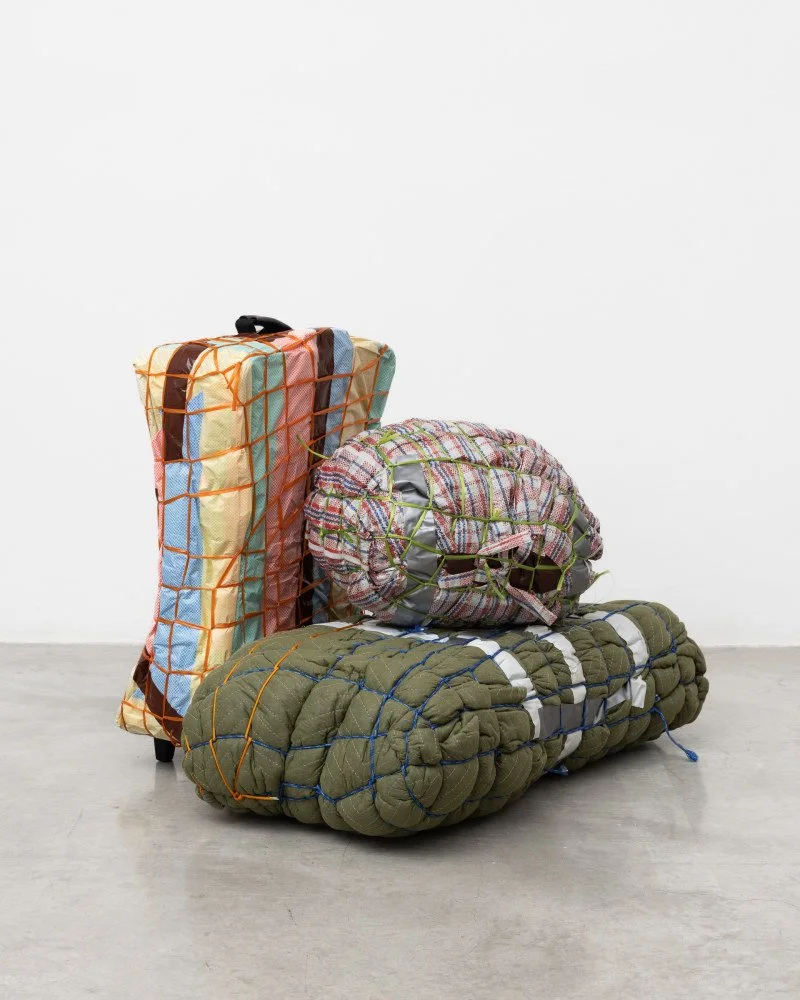Maia Ruth Lee
“The skin of the earth is seamless”
New York, 525 West 21st Street
For her first exhibition with the gallery, Lee debuts a series of paintings, sculptures, and video, all developed over the course of the past year. These works expand on Lee’s Bondage Baggage series (2018-ongoing), born out of the artist’s longstanding concerns surrounding the physical, psychological, and emotional experiences of a diasporic migratory life. The works included in the exhibition speak to the potentiality of healing and transformation that could take place despite or rather, through mobility and rootlessness. Through abstraction, Lee’s work fluctuates between states of being settled and states of change.
All works presented in this exhibition stem from a material process that is at once tactile and painterly. The Bondage Baggage sculptures were originally developed in reference to the luggage seen on conveyor belts at the international airport in Kathmandu, where the artist spent her childhood. As objects that witness and endure limitations of physical borders, the parcels appear to the artist as containers of stories and ideas. Linen, clothing, and used materials are bunched together, covered with plastic, tarps, burlap or canvas, then meticulously fastened with rope-like cord in order to create the sculptures. The soft surfaces of these bundles often bulge and strain, evoking the fundamentals of containment and constraint, but also that of fortitude and resilience. Installed throughout the galleries, the physical qualities of these works evince notions of self-preservation, protection, and manifestation.
Maia Ruth Lee B.B. 23-7, B.B. 23-8, B.B. 23-6, 2023 Rope, tarp, tape, luggage, cardboard, bedding 26 x 31 x 10 in 66.4 x 78.74x 25.4 cm
Some Bondage Baggage sculptures do not remain in these forms. The canvas layer of the sculptures is painted in ink and left to seep around and through the ropes. These ropes are then cut, allowing the “skin” of the sculptures to be unfurled, revealing Lee’s Bondage Baggage paintings. Summoning the appearance of leather or aging skin, each painting reveals track-like imprints that evidence the act of bondage performed on it previously. Although creases and traces are visible, they maintain an energetic, almost entropic charge. Often structured as burst-like compositions, the paintings seemingly radiate from an internal center outward. Describing these works as “vital embodiment of change, mutation, and growth,” the artist has conceptualized these paintings as visceral expressions of expansion and aliveness. These paintings stand in contrast to the second sculptural series on view: empty, shell-like “pods” that are suspended and scattered within the gallery space. Made from the discarded ropes cut away from the body of the original Bondage Baggage sculptures, these works can be seen as the exoskeletal structure shed during the work’s metamorphosis. Remaining as fragile subjects, they bear only the vestiges of the items they once served to protect.
The exhibition’s title refers to a quote in writer Gloria Anzaldúa’s 1987 text “Borderlands/La Frontera”. Although Anzaldúa likens having a diasporic identity to having an open wound, she writes that “the skin of the earth is seamless, the sea cannot be fenced, el mar does not stop at borders.” In “The Letter”, a new video that Lee made for the exhibition, she stitches together footage of old family videos shot by her father in her rural hometown of Nepal. Subtitled with text from Lee’s personal letters written between 2020 through 2022, the seemingly mundane moments captured in the video provoke questions and concerns surrounding the home, family, spiritual inheritance, language, and translation. A tender and poignant portrait of one’s interior self, the exhibition centers migration as a generative, powerful force for creation.







